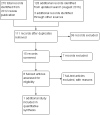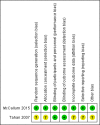Antibiotics for persistent cough or wheeze following acute bronchiolitis in children
- PMID: 28828759
- PMCID: PMC6483479
- DOI: 10.1002/14651858.CD009834.pub3
Antibiotics for persistent cough or wheeze following acute bronchiolitis in children
Abstract
Background: Bronchiolitis is a common acute respiratory condition with high prevalence worldwide. This clinically diagnosed syndrome is manifested by tachypnoea (rapid breathing), with crackles or wheeze in young children. In the acute phase of bronchiolitis (≤ 14 days), antibiotics are not routinely prescribed unless the illness is severe or a secondary bacterial infection is suspected. Although bronchiolitis is usually self-limiting, some young children continue to have protracted symptoms (e.g. cough and wheezing) beyond the acute phase and often re-present to secondary care.
Objectives: To compare the effectiveness of antibiotics versus controls (placebo or no treatment) for reducing or treating persistent respiratory symptoms following acute bronchiolitis within six months of acute illness.
Search methods: We searched the following databases: the Cochrane Airways Group Register of Trials, the Cochrane Central Register of Controlled Trials (CENTRAL), MEDLINE (Ovid), Embase (Ovid), the World Health Organization (WHO) trial portal, the Australian and New Zealand Clinical Trials Registry, and ClinicalTrials.gov, up to 26 August 2016.
Selection criteria: We included randomised controlled trials (RCTs) comparing antibiotics versus controls (placebo or no treatment) given in the post-acute phase of bronchiolitis (> 14 days) for children younger than two years with a diagnosis of bronchiolitis.
Data collection and analysis: Two review authors independently assessed studies against predefined criteria, and selected, extracted, and assessed data for inclusion. We contacted trial authors for further information.
Main results: In this review update, we added one study with 219 children. A total of two RCTs with 249 children (n = 240 completed) were eligible for inclusion in this review. Both studies contributed to our primary and secondary outcomes, but we assessed the quality of evidence for our three primary outcomes as low, owing to the small numbers of studies and participants; and high attrition in one of the studies. Data show no significant differences between treatment groups for our primary outcomes: proportion of children (n = 249) who had persistent symptoms at follow-up (odds ratio (OR) 0.69, 95% confidence interval (CI) 0.37 to 1.28; fixed-effect model); and number of children (n = 240) rehospitalised with respiratory illness within six months (OR 0.54, 95% CI 0.05 to 6.21; random-effects model). We were unable to analyse exacerbation rate because studies used different methods to report this information. Data showed no significant differences between treatment groups for our secondary outcome: proportion of children (n = 240) with wheeze at six months (OR 0.47, 95% CI 0.06 to 3.95; random-effects model). One study reported bacterial resistance, but only at 48 hours (thus with limited applicability for this review). Another study reported adverse events from which all children recovered and remained in the study.
Authors' conclusions: Current evidence is insufficient to inform whether antibiotics should be used to treat or prevent persistent respiratory symptoms in the post-acute bronchiolitis phase. Future RCTs are needed to evaluate the efficacy of antibiotics for reducing persistent respiratory symptoms. This is particularly important in populations with high acute and post-acute bronchiolitis morbidity (e.g. indigenous populations in Australia, New Zealand, and the USA).
Conflict of interest statement
Three review authors (GBM, PSM, and ABC) were authors of the McCallum 2015 paper. Review author EJP, who was not involved in the McCallum 2015 trial, extracted data for this review.
Figures









Update of
-
Antibiotics for persistent cough or wheeze following acute bronchiolitis in children.Cochrane Database Syst Rev. 2012 Dec 12;12:CD009834. doi: 10.1002/14651858.CD009834.pub2. Cochrane Database Syst Rev. 2012. Update in: Cochrane Database Syst Rev. 2017 Aug 22;8:CD009834. doi: 10.1002/14651858.CD009834.pub3 PMID: 23235681 Updated. Review.
Similar articles
-
Antibiotics for persistent cough or wheeze following acute bronchiolitis in children.Cochrane Database Syst Rev. 2012 Dec 12;12:CD009834. doi: 10.1002/14651858.CD009834.pub2. Cochrane Database Syst Rev. 2012. Update in: Cochrane Database Syst Rev. 2017 Aug 22;8:CD009834. doi: 10.1002/14651858.CD009834.pub3 PMID: 23235681 Updated. Review.
-
Folic acid supplementation and malaria susceptibility and severity among people taking antifolate antimalarial drugs in endemic areas.Cochrane Database Syst Rev. 2022 Feb 1;2(2022):CD014217. doi: 10.1002/14651858.CD014217. Cochrane Database Syst Rev. 2022. PMID: 36321557 Free PMC article.
-
Antibiotics for exacerbations of asthma.Cochrane Database Syst Rev. 2018 Jun 25;6(6):CD002741. doi: 10.1002/14651858.CD002741.pub2. Cochrane Database Syst Rev. 2018. PMID: 29938789 Free PMC article. Review.
-
Antibiotic therapy versus no antibiotic therapy for children aged 2 to 59 months with WHO-defined non-severe pneumonia and wheeze.Cochrane Database Syst Rev. 2021 Jan 20;1(1):CD009576. doi: 10.1002/14651858.CD009576.pub3. Cochrane Database Syst Rev. 2021. PMID: 33469915 Free PMC article.
-
Antibiotics for bronchiolitis in children under two years of age.Cochrane Database Syst Rev. 2014 Oct 9;2014(10):CD005189. doi: 10.1002/14651858.CD005189.pub4. Cochrane Database Syst Rev. 2014. PMID: 25300167 Free PMC article. Review.
Cited by
-
3% nebulized hypertonic saline versus normal saline for infants with acute bronchiolitis: A systematic review and meta-analysis of randomized controlled trials.Medicine (Baltimore). 2022 Oct 28;101(43):e31270. doi: 10.1097/MD.0000000000031270. Medicine (Baltimore). 2022. PMID: 36316926 Free PMC article.
-
Outpatient respiratory syncytial virus infections and novel preventive interventions.Curr Opin Pediatr. 2024 Apr 1;36(2):171-181. doi: 10.1097/MOP.0000000000001323. Epub 2023 Dec 12. Curr Opin Pediatr. 2024. PMID: 38085019 Free PMC article. Review.
-
Non-invasive ventilation for the management of children with bronchiolitis (NOVEMBR): a feasibility study and core outcome set development protocol.Trials. 2018 Nov 14;19(1):627. doi: 10.1186/s13063-018-2969-9. Trials. 2018. PMID: 30428935 Free PMC article.
-
Cost-utility analysis of palivizumab for preventing respiratory syncytial virus in preterm neonates and infants in Colombia.BMC Infect Dis. 2024 Apr 19;24(1):418. doi: 10.1186/s12879-024-09300-5. BMC Infect Dis. 2024. PMID: 38641577 Free PMC article.
-
Acute Viral Bronchiolitis: A Narrative Review.J Pediatr Intensive Care. 2020 Sep 2;12(2):79-86. doi: 10.1055/s-0040-1715852. eCollection 2023 Jun. J Pediatr Intensive Care. 2020. PMID: 37082471 Free PMC article. Review.
References
References to studies included in this review
McCallum 2015 {published data only}
Tahan 2007 {published data only}
-
- Tahan F, Ozcan A, Koc N. Clarithromycin in the treatment of RSV bronchiolitis: a double‐blind, randomised, placebo‐controlled trial. European Respiratory Journal 2007;29:91‐7. - PubMed
References to studies excluded from this review
Beigelman 2015 {published data only}
-
- Beigelman A, Isaacson‐Schmid M, Sajol G, Baty J, Rodrigues OM, Leege E, et al. Randomized trial to evaluate azithromycin's effects on serum and upper airway IL‐8 levels and recurrent wheezing in infants with respiratory syncytial virus bronchiolitis. Journal of Allergy and Clinical Immunology 2015;135(5):1171‐8e1. [CN‐01087161; CN‐01130880; CN‐01136644; P30 CA091842] - PMC - PubMed
Friis 1984 {published data only}
Kabir 2009 {published data only}
-
- Kabir A, Mollah A, Anwar K, Rahman A, Amin R, Rahman M. Management of bronchiolitis without antibiotics: a multicentre randomized control trial in Bangladesh. Acta Paediatrica 2009;98:1593‐9. - PubMed
Kneyber 2008 {published data only}
-
- Kneyber MC, Woensel JB, Uitjendaal E, Uiterwaal C, Kimpen J. Azithromycin does not improve disease course in hospitalized infants with respiratory syncytial virus (RSV) lower respiratory tract disease: a randomized equivalence trial. Pediatric Pulmonology 2008;43:142‐9. - PubMed
Mazumder 2009 {published data only}
-
- Mazumder M, Hossain M, Kabir A. Management of bronchiolitis with or without antibiotics ‐ a randomized control trial. Journal of Bangladesh College of Physicians and Surgeons 2009;27:63‐9.
McCallum 2013 {published data only}
Pinto 2012 {published data only}
-
- Pinto LA, Pitrez PM, Luisi F, Mello PP, Gerhardt M, Marostica PJ. Azithromycin therapy in hospitalized infants with acute bronchiolitis is not associated with better clinical outcomes: a randomized, double‐blinded, and placebo‐controlled clinical trial. Journal of Paediatrics 2012;161(6):1104‐8. [RBR‐257ZBC; SN‐1099‐0496] - PubMed
Additional references
Bailey 2009
-
- Bailey EJ, Maclennan C, Morris PS, Kruske SG, Brown N, Chang AB. Risks of severity and readmission of indigenous and non‐indigenous children hospitalised for bronchiolitis. Journal of Paediatrics and Child Health 2009;45:593‐7. - PubMed
Blom‐Danielle 2007
Carroll 2009
Chang 2009
-
- Chang AB, Chang CC, O'Grady K, Torzillo PJ. Lower respiratory tract infections. Pediatric Clinics of North America 2009;56(6):1303‐21. - PubMed
Chang 2017
-
- Chang AB, Oppenheimer JJ, Weinberger M, Rubin BK, Weir K, Irwin RS. Management of children with chronic wet cough and protracted bacterial bronchitis: CHEST Guideline and Expert Panel Report. Chest 2017;151(4):884‐90. - PubMed
Didierlaurent 2008
Fox 1999
Giamarellos‐Bourboulis 2008
-
- Giamarellos‐Bourboulis EJ. Macrolides beyond the conventional antimicrobials: a class of potent immunomodulators. International Journal of Antimicrobial Agents 2008;31(1):12‐20. - PubMed
GRADEpro GDT 2015
-
- GRADEpro GDT. GRADEpro Guideline Development Tool [Software]. McMaster University, 2015 (developed by Evidence Prime, Inc.). gradepro.org.
Halfhide 2008
Higgins 2011
-
- Higgins JPT, Green S (editors). Cochrane Handbook for Systematic Reviews of Interventions Version 5.1.0 [March 2011]. The Cochrane Collaboration, 2011. www.cochrane‐handbook.org.
Kim 2010
-
- Kim CK, Choi J, Kim HB, Callaway Z, Shin BM, Kim JT, et al. A randomized intervention of montelukast for post‐bronchiolitis: effect on eosinophil degranulation. Journal of Pediatrics 2010;156(5):749‐54. - PubMed
Leach 1994
-
- Leach AJ, Boswell JB, Asche V, Nienhuys TG, Mathews JD. Bacterial colonization of the nasopharynx predicts very early onset and persistence of otitis media in Australian aboriginal infants. Pediatric Infectious Disease Journal 1994;13(11):983‐9. - PubMed
Leconte 2008
Marchant 2005
Marchant 2012
McCallum 2012
McCallum 2016
McCullers 2006
NICE 2015
-
- National Institute for Health and Care Excellence (NICE). Bronchiolitis: diagnosis and management in children. www.nice.org.uk/Guidance/NG9 2015. - PubMed
Ralston 2014
-
- Ralston SL, Lieberthal AS, Meissner HC, Alverson BK, Baley JE, Gadomski AM, et al. Clinical practice guideline: the diagnosis, management, and prevention of bronchiolitis. Pediatrics 2014;134:e1474‐e1502. - PubMed
RevMan 2014 [Computer program]
-
- The Nordic Cochrane Centre, The Cochrane Collaboration. Review Manager (RevMan). Version 5.3. Copenhagen: The Nordic Cochrane Centre, The Cochrane Collaboration, 2014.
SIGN 2006
-
- Scottish Intercollegiate Guidelines Network (SIGN). Bronchiolitis in children: a national clinical guideline. Archives of Disease in Childhood Education and Practice Edition 2006;91:1‐46. - PubMed
Sigurs 2000
-
- Sigurs N, Bjarnason R, Sigurbergsson F, Kjellman B. Respiratory syncytial virus bronchiolitis in infancy is an important risk factor for asthma and allergy at age 7. American Journal of Respiratory and Critical Care Medicine 2000;161:1501‐7. - PubMed
Spurling 2011
Su 2014
-
- Su SC, Chang AB. Improving the management of children with bronchiolitis: the updated American Academy of Pediatrics clinical practice guideline. Chest 2014;6:1428‐30. - PubMed
Swingler 2000
-
- Swingler GH, Hussey GD, Zwarenstein M. Duration of illness in ambulatory children diagnosed with bronchiolitis. Archives of Pediatrics and Adolescent Medicine 2000;154:997‐1000. - PubMed
Wong 2005
Zarogoulisidis 2011
-
- Zarogoulidis P, Papanas N, Kioumis I, Chatzaki E, Maltezos E, Zarogoulidis K. Macrolides: from in vitro anti‐inflammatory and immunomodulatory properties to clinical practice in respiratory diseases. European Journal of Clinical Pharmacology 2011;67:1‐25. - PubMed
Publication types
MeSH terms
Substances
LinkOut - more resources
Full Text Sources
Other Literature Sources
Medical

